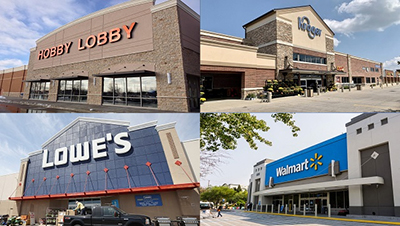
Net Lease Retail, Office Cap Rates Expand

The Boulder Group, Wilmette, Ill., said single-tenant retail and office net lease cap rates increased slightly in the second quarter as interest rates and inflation increased.
Single-tenant cap rates increased by 5 and 7 basis points for the retail and office categories, respectively.
Cap rates for single-tenant industrial held steady at the prior quarter’s level, The Boulder Group said in its Second Quarter Net Lease Research Report.
“Following record low cap rate levels for all three asset classes in the first quarter, the increase in borrowing costs and the current inflationary environment were the main determining factors for the change in cap rates,” said Randy Blankstein, President of The Boulder Group.
The Federal Reserve announced two interest rate hikes during the second quarter, one in May for 50 basis points and another 75 basis point increase in June–the largest rate hike since 1994. Accordingly, for the first time since 2018, the 10-year Treasury yield surpassed 3.00%, peaking near 3.50% in mid-June. This correlated to higher borrowing costs and created a pause for some net lease investors looking to acquire assets at higher cap rates, Boulder said.
“Some sellers may choose to hold assets versus a sale given a decline in value,” said Jimmy Goodman, Partner with the firm. He noted second-quarter transaction volume dropped 15% compared with a year before.
Boulder Group Senior Vice President John Feeney said lower-priced net lease properties experienced less impact in pricing, likely because there are more cash purchasers at lower price points. “Higher priced properties faced more upward cap rate pressure as net lease investors saw diminished leveraged returns for these assets as borrowing costs increased,” he said.
Aside from commercial mortgage-backed securities lending, which remains volatile, net lease lending terms changed little during the quarter, though interest rates rose. “Rising rates caused lenders to constrain loan proceeds, limiting loan-to-value in order to keep healthy debt service coverage ratios,” the report said.
Net lease investors will likely carefully monitor the Federal Reserve’s monetary policy and its impact on the capital markets. The sector’s transaction activity will depend on the number of Section 1031 buyers motivated by tax consequences and seller willingness to move to pricing that will meet non-1031 buyer’s return thresholds, it said.
“Cap rates will continue to face upward pressure as additional rate hikes from the Federal Reserve are expected in 2022,” Blankstein said. “However, the limited supply of properties with long term leases to credit tenants will keep competition amongst investors.”
